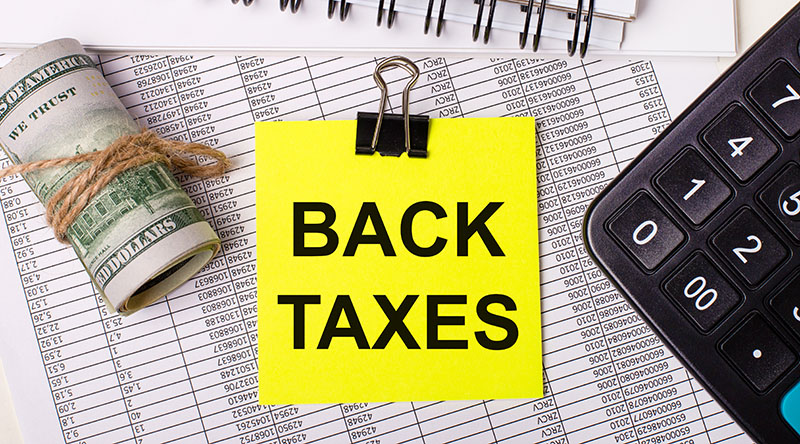
by Renee Lawson | Jun 16, 2025 | Tax Preparation, Tax Resolution
Dealing with tax issues can be one of the most stressful experiences in life. Whether it’s a notice from the IRS, a mounting tax debt, or a complex audit, many people find themselves overwhelmed and unsure of how to proceed. Recognizing when you need professional help, like the kind we provide at Action Tax Relief, and understanding what a tax resolution specialist does are crucial steps toward resolving your tax problems effectively.
In this blog, we’ll explore how to know when you need a tax resolution specialist and how they help you regain control of your financial situation.
Signs You Need a Tax Resolution Specialist
If you’re unsure whether you need professional assistance, here are some common signs that it’s time to contact a tax resolution specialist:
1. Receiving Notices from the IRS or State Tax Agency
If you’ve received letters or notices from the IRS or your state tax agency, it’s essential to address them promptly. Ignoring these communications can lead to more severe consequences, such as penalties, interest, or even legal action.
2. Facing Wage Garnishments or Bank Levies
When the IRS or a state tax agency begins garnishing your wages or levying your bank account, it’s a clear sign that immediate action is needed. A tax resolution specialist can help stop these aggressive collection actions and negotiate a resolution.
3. Owing Back Taxes You Can’t Afford to Pay
If you owe more taxes than you can reasonably pay, a specialist can help you explore options like installment agreements or Offers in Compromise to reduce your burden.
4. Being Selected for a Tax Audit
Audits can be intimidating, especially if you’re unsure of how to respond. A tax resolution specialist can guide you through the process, ensuring that your rights are protected, and your case is presented effectively.
5. Struggling with Complex Tax Laws
Tax laws are notoriously complicated, and even small mistakes can lead to significant penalties. If you’re struggling to navigate the rules or feel overwhelmed by your situation, a specialist’s expertise can make all the difference.
What Does a Tax Resolution Specialist Do?
A tax resolution specialist is a licensed professional—usually a Certified Public Accountant (CPA), Enrolled Agent (EA), or tax attorney—who specializes in helping individuals and businesses resolve tax issues. Here’s how they can assist:
1. Assessing Your Tax Situation
Tax resolution specialists begin by analyzing your financial records, tax returns, and correspondence with the IRS or state tax agencies. This thorough assessment allows them to identify the root of the problem and develop a tailored strategy for resolution.
2. Navigating Tax Laws and Procedures
With their in-depth knowledge of tax laws and IRS procedures, specialists can ensure compliance and help you avoid additional penalties. They know how to interpret complex regulations and apply them to your unique circumstances.
3. Representing You Before Tax Agencies
Dealing with the IRS or state tax agencies can be stressful and intimidating. A tax resolution specialist acts as your representative, handling all communication and negotiations on your behalf. This not only reduces your stress but also improves your chances of a favorable outcome.
4. Negotiating Settlements and Payment Plans
Whether it’s an Offer in Compromise, penalty abatement, or an installment agreement, tax resolution specialists are skilled negotiators. They work to secure the best possible terms for you, helping to resolve your tax issues efficiently.
5. Protecting Your Rights
Taxpayers have rights, and a tax resolution specialist ensures that those rights are upheld. They act as your advocate, ensuring that you’re treated fairly throughout the resolution process.
Common Tax Issues Addressed by Specialists
Here are some of the most common problems a tax resolution specialist can help with:
1. Unpaid Tax Debts
If you owe back taxes, a specialist can help create a plan to address the debt, whether through payment plans or negotiated settlements.
2. Tax Liens and Levies
A specialist can negotiate to have liens and levies removed or prevented, protecting your assets and credit score.
3. Wage Garnishments
Specialists can work to stop wage garnishments and help you resolve the underlying tax issue.
4. Tax Audits
Facing an audit? A tax resolution specialist can represent you during the process and ensure the audit is handled correctly.
5. Penalty Abatement
If you’ve been hit with penalties, a specialist can request abatement if you have reasonable cause, potentially saving you thousands of dollars.
When to Take Action
It’s never too early to contact a tax resolution specialist. Taking action as soon as you notice a problem can prevent it from escalating and save you time, money, and stress in the long run. Situations that warrant immediate attention include:
- Receiving a notice from the IRS or state tax agency
- Facing wage garnishments, bank levies, or tax liens
- Owing more taxes than you can afford to pay
- Being selected for a tax audit
- Feeling overwhelmed by complex tax laws
Conclusion
Tax issues can be daunting but knowing when to seek help and understanding what a tax resolution specialist does can make all the difference. These professionals provide the expertise and support you need to resolve your tax problems effectively, allowing you to focus on what matters most.
If you’re dealing with tax problems, take the first step toward resolution today. Contact Action Tax Relief at www.actiontaxrelief.com or call 937-268-2737 to speak with a qualified tax resolution specialist.

by Renee Lawson | Jun 9, 2025 | Tax Preparation, Tax Resolution
An IRS appeals hearing can be an intimidating experience, but it’s also an opportunity to resolve tax disputes without going to court. If you’ve received a notice to attend an IRS appeals hearing, preparation is key to achieving a favorable outcome. This blog outlines the steps you can take to prepare effectively and increase your chances of success.
If you need professional guidance, Action Tax Relief is here to help. Call us at 937-268-2737 or visit www.ActionTaxRelief.com to schedule a consultation.
What Is an IRS Appeals Hearing?
An IRS appeals hearing is a formal process where taxpayers can contest IRS decisions regarding audits, penalties, or other tax-related matters. The Office of Appeals is an independent division of the IRS, and its role is to provide a fair and impartial resolution of disputes.
Attending an appeals hearing gives you the chance to present your case, provide supporting documentation, and negotiate a resolution without going to court. However, preparation is critical to making the most of this opportunity.
Step 1: Understand Your Appeal Rights
Before attending an appeals hearing, familiarize yourself with your rights as a taxpayer. These include the right to:
- Be treated professionally and respectfully.
- Dispute the IRS’s findings if you believe they are incorrect.
- Retain legal representation or hire a tax professional.
- Access your case file to review the IRS’s evidence.
By understanding your rights, you’ll be better equipped to advocate for yourself during the hearing.
Step 2: Review the IRS Notice Carefully
When the IRS schedules an appeals hearing, they will send you a written notice outlining the details of your case. Carefully review this notice to:
- Identify the specific issue(s) being contested.
- Note any deadlines or required actions.
- Understand the IRS’s position and evidence.
Step 3: Gather Supporting Documentation
To build a strong case, you’ll need to provide evidence that supports your position. Examples of supporting documentation include:
- Tax returns and related records.
- Receipts, invoices, and bank statements.
- Correspondence with the IRS.
- Expert opinions or valuations, if applicable.
Organize your documents in a logical order and highlight key points for easy reference during the hearing.
Step 4: Prepare a Written Summary
A written summary of your case can help you present your argument clearly and concisely. Include the following elements in your summary:
- Introduction:
- Briefly explain the issue under appeal and your main points.
- Background:
- Provide context for the dispute, including relevant dates and events.
- Evidence:
- Summarize the supporting documentation you’ve gathered.
- Conclusion:
- State the resolution you’re seeking and why it’s justified.
Having a written summary will help you stay focused and ensure you cover all critical points during the hearing.
Step 5: Practice Your Presentation
Effective communication is essential during an IRS appeals hearing. Practice presenting your case in a clear, confident, and respectful manner. Consider the following tips:
- Anticipate questions the appeals officer might ask.
- Rehearse your responses to potential challenges.
- Stay calm and composed, even if the discussion becomes tense.
Step 6: Understand the Appeals Process
Familiarize yourself with the steps involved in the appeals process so you know what to expect. Key stages include:
- Pre-Hearing Preparation:
- Submit requested documents and prepare your presentation.
- The Hearing:
- Present your case and respond to the appeals officer’s questions.
- Post-Hearing Deliberation:
- The appeals officer will review the evidence and make a decision.
- Final Decision:
- You’ll receive a written determination outlining the outcome.
Step 7: Consider Professional Representation
Navigating an IRS appeals hearing can be complex, especially if you’re unfamiliar with tax laws and procedures. A tax professional or attorney can:
- Provide expert advice tailored to your situation.
- Help you prepare your case and documentation.
- Represent you during the hearing and negotiate on your behalf.
Common Mistakes to Avoid
To maximize your chances of success, steer clear of these common pitfalls:
- Missing Deadlines:
- Submit all required documents on time to avoid delays or dismissal of your appeal.
- Failing to Prepare:
- Thorough preparation is crucial to presenting a strong case.
- Being Disrespectful:
- Treat the appeals officer with courtesy and professionalism.
- Neglecting Professional Help:
- Going it alone can be risky, especially if your case is complex.
Take Action Today
An IRS appeals hearing is your chance to resolve tax disputes without the need for litigation. By understanding your rights, gathering evidence, and preparing thoroughly, you can present a compelling case and work toward a favorable resolution.
If you’re feeling overwhelmed, Action Tax Relief is here to guide you through every step of the process. Call us at 937-268-2737 or visit www.ActionTaxRelief.com to schedule a consultation and take the first step toward resolving your tax dispute.

by Renee Lawson | May 19, 2025 | Tax Preparation, Tax Resolution
Which One Is Right for You?
Dealing with tax debt can feel overwhelming. Whether you owe a small amount or a significant sum, finding the right resolution option is essential to avoiding penalties, interest, and enforcement actions from the IRS. Fortunately, there are various tax debt resolution options available to suit different financial situations. In this blog, we’ll explore these options in detail to help you determine which one might be right for you. And if after reading this you still have questions feel free to give us here at Action Tax Relief call at 937-268-2737.
Why Resolving Tax Debt Matters
Unresolved tax debt doesn’t just go away—it grows. The IRS adds penalties and interest to unpaid taxes, which can quickly turn a manageable debt into a substantial financial burden. Beyond monetary consequences, the IRS can take enforcement actions such as wage garnishments, bank levies, or property liens.
By addressing your tax debt proactively, you can avoid these consequences and regain financial peace of mind. Here’s an overview of the most common resolution options available.
1. Installment Agreement
An Installment Agreement allows you to pay your tax debt over time in manageable monthly installments. This option is ideal for taxpayers who cannot pay their full balance upfront but can afford to make regular payments.
Key Benefits:
- Spreads payments over time.
- Prevents more aggressive IRS enforcement actions.
- Easy to set up for debts under $50,000.
Considerations:
- Interest and penalties continue to accrue until the balance is paid in full.
- Missing payments can result in default and additional penalties.
2. Offer in Compromise (OIC)
An Offer in Compromise allows eligible taxpayers to settle their tax debt for less than the full amount owed. The IRS considers factors such as income, expenses, and asset equity when evaluating OIC applications.
Key Benefits:
- Potentially reduces your overall tax liability.
- Provides a fresh start if approved.
Considerations:
- Strict eligibility criteria.
- Requires full disclosure of financial information.
- The application process can be time-consuming.
3. Currently Not Collectible (CNC) Status
If you’re experiencing financial hardship and cannot pay your tax debt, you may qualify for Currently Not Collectible (CNC) status. This status temporarily halts IRS collection efforts, such as wage garnishments or levies.
Key Benefits:
- Provides immediate relief from collection actions.
- Allows you to focus on improving your financial situation.
Considerations:
- Interest and penalties continue to accrue.
- The IRS will review your financial situation periodically to determine if CNC status should continue.
CNC status can be a lifeline for those in financial distress.
4. Penalty Abatement
The IRS may waive penalties for taxpayers who can demonstrate a reasonable cause for failing to pay or file their taxes on time. Examples of reasonable cause include illness, natural disasters, or unavoidable financial setbacks.
Key Benefits:
- Reduces the overall amount owed.
- Encourages compliance moving forward.
Considerations:
- Does not eliminate the tax debt itself.
- Requires thorough documentation to support your request.
5. Innocent Spouse Relief
If your tax debt is the result of a spouse’s or former spouse’s actions, you may qualify for Innocent Spouse Relief. This option removes your liability for taxes, penalties, and interest caused by your spouse’s errors or omissions.
Key Benefits:
- Protects you from being held accountable for someone else’s actions.
- Provides relief in cases of unfair financial burden.
Considerations:
- Only applies to certain types of tax debt.
- Requires detailed evidence to support your claim.
6. Bankruptcy
In some cases, tax debt can be discharged through bankruptcy. However, this option is subject to strict eligibility criteria, and not all tax debts are dischargeable.
Key Benefits:
- Offers a potential fresh start.
- Can eliminate other financial obligations in addition to tax debt.
Considerations:
- Significant impact on your credit score.
- Complex legal process requiring professional guidance.
If you’re considering bankruptcy as a solution, consult with a tax resolution expert to understand how it may affect your tax debt.
How to Choose the Right Option
Selecting the right tax debt resolution option depends on several factors, including:
- The total amount of your debt.
- Your current financial situation.
- Your long-term financial goals.
Common Mistakes to Avoid
When resolving tax debt, it’s important to avoid common pitfalls that can complicate your situation:
- Ignoring IRS Notices: Responding promptly to IRS communications can prevent escalation.
- Choosing the Wrong Resolution Option: Selecting an option without fully understanding its implications can lead to more problems.
- Filing Incomplete or Inaccurate Information: Errors on forms or applications can delay the process or result in rejection.
- Failing to Seek Professional Help: Navigating tax debt resolution on your own can be overwhelming and increase the risk of mistakes.
Take Action Today
Dealing with tax debt can be stressful, but you don’t have to face it alone. Whether you’re considering an Installment Agreement, Offer in Compromise, or another resolution option, Action Tax Relief is here to guide you every step of the way.
Call us at 937-268-2737 or visit www.ActionTaxRelief.com to schedule a consultation. Together, we’ll create a plan to resolve your tax debt and help you achieve financial peace of mind.

by Renee Lawson | May 5, 2025 | Tax Preparation, Tax Resolution
A Simple Guide
Falling behind on filing your taxes can be a daunting situation. For many, the fear of penalties or the complexity of filing multiple years’ worth of taxes prevents them from taking action. However, filing back taxes is a crucial step in avoiding serious IRS trouble and regaining financial control.
In this guide, we’ll walk you through the steps to file back taxes, explain why it’s important, and offer advice on how to handle the process smoothly. If you need personalized assistance, Action Tax Relief is here to help.
Why Filing Back Taxes is Critical
Ignoring unfiled taxes doesn’t make the problem disappear. In fact, it often makes matters worse. Here’s why filing back taxes is essential:
- Avoid Penalties and Interest: The IRS charges both penalties and interest on unpaid taxes. The longer you wait, the more these amounts can grow, significantly increasing your financial burden.
- Prevent IRS Enforcement Actions: If you fail to file, the IRS can take enforcement actions like wage garnishments, bank levies, or property liens. Filing your back taxes is a proactive way to avoid these drastic measures.
- Protect Your Future Refunds: If you have unfiled returns, the IRS can withhold any future tax refunds to offset your unpaid debt. Filing back taxes ensures you can claim what’s rightfully yours.
- Stay Compliant: Filing your taxes is a legal obligation. Staying current demonstrates your commitment to fulfilling your responsibilities as a taxpayer.
Step-by-Step Guide to Filing Back Taxes
The process of filing back taxes may feel overwhelming, but breaking it down into manageable steps can make it much easier.
1. Gather Your Financial Records
The first step is collecting the necessary documents for the years you need to file. These include:
- W-2s or 1099s from employers or clients.
- Bank and investment account statements.
- Receipts for deductible expenses, such as medical bills or charitable donations.
- Prior tax returns (if available).
If you’re missing important documents, the IRS can provide a transcript of your income information.
2. Use the Correct Tax Forms
Each tax year requires its specific forms and instructions. These can be downloaded from the IRS website. Be sure to use the correct year’s form to ensure accurate reporting.
3. Prepare Your Tax Returns
Accurately complete each return, ensuring all income and deductions are properly reported. While this can be done independently, hiring a tax professional can save you time and reduce the risk of errors.
4. Submit Your Returns
Mail your completed tax returns to the IRS. If you owe taxes, include a payment or set up a payment arrangement to begin addressing your balance.
What to Do If You Owe Back Taxes
Owing money to the IRS can feel intimidating, but there are several options to resolve your debt:
- Installment Agreements: Spread your payments over time with a manageable monthly plan.
- Offer in Compromise: Settle your tax debt for less than the full amount owed if you meet certain qualifications.
- Currently Not Collectible Status: Temporarily halt collection efforts if you’re facing financial hardship.
How to Avoid Future Filing Issues
Once you’ve filed your back taxes, staying on track with your future filings is essential. Here are some tips to help you remain compliant:
- Set Reminders: Mark your calendar with key tax deadlines to avoid missing them.
- Organize Your Documents: Keep your financial records organized throughout the year to make filing easier.
- Consult a Tax Professional: Work with a tax advisor to ensure your returns are accurate and filed on time.
- Use Electronic Filing: File your taxes electronically to ensure faster processing and fewer errors.
- Adjust Withholdings: If you consistently owe taxes, adjust your withholdings to better match your tax liability.
The Risks of Not Filing Back Taxes
Failing to address unfiled taxes can lead to severe consequences, including:
- Substitute for Return (SFR): If you don’t file, the IRS may file a substitute return on your behalf. These returns often exclude deductions and credits, resulting in a higher tax bill.
- Loss of Refunds: Refunds for unfiled returns are forfeited if not claimed within three years.
- Tax Liens and Levies: The IRS can place liens on your property or seize your assets to collect unpaid taxes.
- Criminal Charges: In extreme cases, failure to file can result in criminal prosecution.
Take Action Today
Filing back taxes is a critical step in avoiding IRS trouble and regaining financial peace of mind. Don’t wait until enforcement actions make the situation worse. Take control of your tax situation today.
At Action Tax Relief, we’re here to help you every step of the way. Call us at 937-268-2737 or visit www.ActionTaxRelief.com to schedule a consultation. Together, we’ll create a plan to resolve your tax issues and secure your financial future.

by Renee Lawson | Apr 21, 2025 | Tax Preparation, Tax Resolution
If you owe taxes to the IRS and can’t pay the full amount, it’s important not to panic. Tax debt is a serious issue, but it’s one thing that can be resolved with the right approach and a clear plan. Ignoring the problem won’t make it go away; in fact, it will likely make things worse. At Action Tax Relief we spend all day every day dealing with tax debt. Here’s what you should do right away to tackle your tax debt head-on and avoid further complications.
Step 1: Don’t Ignore IRS Notices
The first step is to open and carefully read any correspondence you receive from the IRS. These notices will detail the amount you owe, including penalties and interest, and provide deadlines for action. Ignoring these letters can result in escalated collection efforts, such as wage garnishments, bank levies, or tax liens.
Step 2: Assess Your Financial Situation
Before taking any action, take a close look at your finances. Ask yourself:
- How much can I realistically afford to pay right now?
- Are there any assets I could sell or liquidate to cover the debt?
- What are my monthly income and essential expenses?
Understanding your financial position is crucial for determining which resolution options are viable for you. Keep in mind that the IRS will also request this information if you negotiate a payment plan or other arrangement.
Step 3: File Your Tax Returns
If you have unfiled tax returns, file them as soon as possible. The IRS requires all past-due returns to be filed before it will consider any resolution options. Additionally, filing can help you avoid additional penalties for failure to file, which can add up quickly.
Even if you can’t pay what you owe, filing your tax return shows good faith and may prevent the IRS from escalating collection actions.
Step 4: Explore Payment Options
The IRS understands that not everyone can pay their tax debt in full immediately. That’s why they offer several payment options designed to make it easier for taxpayers to meet their obligations. Here are some of the most common options:
Installment Agreements
An installment agreement allows you to pay your tax debt over time through manageable monthly payments. There are two main types:
- Short-Term Payment Plans: For debts that can be paid off within 180 days.
- Long-Term Payment Plans: For larger debts requiring extended repayment periods.
Both options require you to provide detailed financial information to the IRS, including income, expenses, and assets.
Offer in Compromise (OIC)
An Offer in Compromise allows you to settle your tax debt for less than the full amount owed. This option is typically available to taxpayers who can demonstrate that paying the full amount would cause financial hardship.
While an OIC can be an excellent solution for eligible taxpayers, it’s important to note that the application process is complex. Working with a tax resolution professional can significantly improve your chances of approval.
Temporary Delay in Collection
If you’re experiencing extreme financial hardship, the IRS may temporarily delay collection efforts. While this doesn’t erase your debt, it provides breathing room to get your finances in order.
Step 5: Communicate with the IRS
Proactively communicating with the IRS can prevent your situation from escalating. Reach out to discuss your options and let them know if you’re unable to pay in full. Be honest and cooperative; the IRS is more likely to work with you if you demonstrate good faith.
If the idea of speaking with the IRS feels intimidating, consider hiring a tax resolution professional to represent you. This ensures that your rights are protected and that you have an experienced advocate handling the process on your behalf.
Step 6: Avoid Additional Penalties
Failing to address your tax debt can result in additional penalties and interest, which increase the total amount you owe. To avoid further financial strain:
- Pay What You Can: Even partial payments can reduce your debt and limit interest accrual.
- Stay Current: File all future tax returns on time and pay any new taxes owed promptly.
Step 7: Protect Your Assets
If your tax debt remains unresolved, the IRS may take enforcement actions, such as filing a tax lien, garnishing your wages, or seizing your bank accounts. To protect your assets, address your tax debt as soon as possible and consider professional help.
Step 8: Seek Professional Assistance
Dealing with tax debt can be overwhelming, but you don’t have to face it alone. A tax resolution professional can:
- Analyze Your Situation: Evaluate your financial circumstances and determine the best course of action.
- Negotiate with the IRS: Secure a payment plan or settlement that works for you.
- Ensure Compliance: Help you file all required returns and stay on track moving forward.
Hiring a professional not only saves you time and stress but also increases your chances of a successful resolution.
Conclusion
If you’re struggling to pay your tax debt, taking prompt and informed action is essential. By understanding your options, communicating with the IRS, and seeking professional assistance, you can resolve your tax issues and move forward with confidence.
Remember, you don’t have to navigate this process alone. At Action Tax Relief, we’re here to help you every step of the way. Call us at 937-268-2737 or visit www.ActionTaxRelief.com to take the first step toward financial freedom today.

by Renee Lawson | Apr 7, 2025 | Tax Preparation, Tax Resolution
Dealing with a tax debt can be a stressful experience, especially when you’re unsure how long the IRS has to collect what you owe. Fortunately, the IRS is bound by a statute of limitations, which limits the amount of time they have to pursue collection on a tax debt. Understanding this timeline is crucial for taxpayers facing collection efforts or seeking a resolution.
In this blog post, we’ll explore the statute of limitations on tax debt, exceptions to the rule, and how you can take steps to resolve your tax issues effectively. If you’re struggling with tax debt, Action Tax Relief is here to help.
What Is the IRS Statute of Limitations on Tax Collection?
The statute of limitations for IRS tax collection is generally 10 years. This means the IRS has 10 years from the date the tax debt was assessed to collect the outstanding balance. Once this period expires, the IRS can no longer legally pursue collection, and the debt is effectively erased.
Key Points About the 10-Year Rule:
- The 10-year clock starts on the date the IRS officially assesses the tax.
- This date is typically when you file your return, or if you fail to file, when the IRS prepares a substitute return on your behalf.
- Penalties and interest accrue during the 10-year period, potentially increasing the amount owed significantly.
It’s important to note that while the statute of limitations is a powerful protection for taxpayers, the IRS will use every tool at its disposal to collect the debt within this time frame.
Exceptions to the 10-Year Rule
There are several scenarios in which the statute of limitations may be extended or paused, giving the IRS more time to collect. These include:
Filing for Bankruptcy
If you file for bankruptcy, the statute of limitations is temporarily suspended during the period your case is pending. Once the bankruptcy process concludes, the IRS will resume its collection efforts, and the 10-year clock will pick up where it left off.
Submitting an Offer in Compromise (OIC)
When you submit an Offer in Compromise, the statute of limitations is paused while the IRS reviews your application. If your OIC is rejected, the clock resumes. However, if your offer is accepted, your debt will be settled, and the statute becomes irrelevant.
Leaving the Country
If you leave the United States for an extended period, the statute of limitations may be suspended. The IRS considers absences from the country as interruptions to the collection timeline, ensuring they have ample opportunity to pursue the debt upon your return.
Entering into an Installment Agreement
While an installment agreement doesn’t pause the statute of limitations, it can impact how quickly the IRS pursues collection. By entering into a payment plan, you demonstrate good faith in resolving the debt, potentially preventing aggressive enforcement actions.
What Happens After the Statute of Limitations Expires?
Once the 10-year period expires, the IRS can no longer legally enforce collection of the debt. However, the expiration of the statute doesn’t automatically remove the debt from your account. The IRS may file a Notice of Federal Tax Lien, which can remain on your credit report until you take action to address it.
Steps to Address Expired Tax Debt:
- Verify the Statute of Limitations: Confirm the assessment date and calculate whether the 10-year period has passed. A tax resolution professional can help with this process.
- Request a Transcript: Obtain your IRS account transcript to review all relevant dates and ensure accuracy.
- Take Action to Remove Liens: If a lien remains after the statute expires, work with the IRS to have it released.
How to Resolve Tax Debt Before the Statute Expires
Waiting for the statute of limitations to run out may seem like an appealing option, but it’s not always the best course of action. The IRS has powerful tools at its disposal, including wage garnishments, bank levies, and property seizures, to collect debts before the statute expires. Taking proactive steps to resolve your debt can save you from financial hardship and stress.
Options for Resolving Tax Debt:
- Installment Agreements: Spread your payments over time with a manageable monthly plan.
- Offer in Compromise: Settle your debt for less than the full amount owed.
- Currently Not Collectible Status: Temporarily halt collection efforts if you’re experiencing financial hardship.
Each option has its own eligibility requirements and benefits. A tax resolution professional can help you determine the best strategy for your situation.
Why Professional Help Matters
Navigating IRS rules and regulations can be complex, especially when dealing with tax debt and the statute of limitations. A tax resolution company can:
- Analyze your financial situation to identify the best resolution options.
- Communicate with the IRS on your behalf to negotiate favorable terms.
- Ensure compliance with all filing and payment requirements.
Protect Yourself from Future Tax Issues
Once you’ve resolved your tax debt, it’s essential to stay compliant with all future tax obligations. Here are some tips to avoid falling into debt again:
- File on Time: Always file your tax returns by the deadline to avoid penalties.
- Make Estimated Payments: If you’re self-employed or have irregular income, make quarterly estimated payments to stay on track.
- Keep Accurate Records: Maintain organized records of your income, expenses, and deductions.
Conclusion
Understanding the IRS statute of limitations on tax debt is a critical step in managing your financial future. While the 10-year rule provides a clear timeline, exceptions and complexities can arise. Taking proactive steps to resolve your tax debt not only prevents enforcement actions but also provides peace of mind.
At Action Tax Relief, we’re committed to helping taxpayers like you overcome IRS challenges and achieve financial freedom. Call us today at 937-268-2737 or visit www.ActionTaxRelief.com to schedule a consultation. Don’t wait—take control of your tax situation now.






